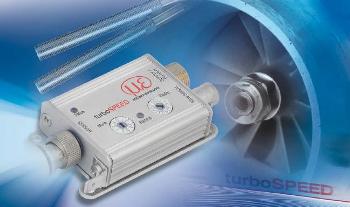Precision sensor manufacturer Micro-Epsilon has launched a new turbocharger speed and temperature sensor system that can be used in both test cell environments and for on-vehicle testing of turbochargers.
 turboSPEED DZ140 turbocharger
turboSPEED DZ140 turbocharger
With a robust miniaturised controller and the ability to measure both aluminium and titanium blades, the system offers the user a variety of useful new features and technical advantages over existing sensors available on the market.
The new turboSPEED DZ140 turbocharger speed and temperature sensor system operates on the eddy current non-contact measuring principle and so is resistant to oil and dirt – a major advantage over optical speed measurement systems. The system is robust, compact in dimension, with a 3mm diameter sensor and a controller that weighs just 85g. This allows the sensor and controller to be installed in engine compartments where space is tight.
Rotation speed and temperature
The turboSPEED DZ140 is a turbocharger rotation speed (and temperature) sensor and controller, which enables measurements on turbocharger blades made from aluminium or titanium. As well as being able to measure the rotational speed of a turbocharger, the DZ140 also enables the user to measure the temperature of the sensor head/tip – which is an industry first. This new feature is particularly useful as it allows the user to monitor the temperature inside the turbocharger without having to fit a separate thermocouple.
Like its predecessors, the DZ140 sensor enables measurements on blades with spacing of up to 2.2mm, at speeds of 200rpm up to 400,000rpm. The sensors offer a high ambient operating temperature of up to 285°C.
Due to its 9-30V DC power supply, the turboSPEED DZ140 can also be used for on-vehicle testing. The sensor system can be powered off a standard vehicle battery.
Robust miniature controller
The robust controller extends the maximum distance allowed between the controller and sensor to 10m. During development of the turboSPEED DZ140, the primary focus was placed on resistance to electromagnetic interference, which means the system is more reliable for multiple test cell environments and for on-vehicle testing.
Chris Jones, Managing Director at Micro-Epsilon UK comments: “The DZ140 was developed very much with the user in mind, which is why the system is now much easier to configure and set up. No adjustment or re-calibration is required when a sensor is replaced. In addition, all parameter settings are now carried out via the front plate of the controller. For example, a tricolour LED indicates when the sensor has reached the ideal distance from the turbocharger blades, reducing installation times significantly. The number of turbocharger blades can also be adjusted on the front of the controller.”